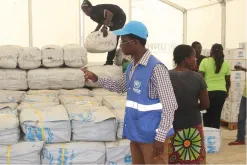Over 15,000 DR Congolese refugees have fled their country following violent conflicts between Government soldiers and rebel groups. The refugees are currently hosted at the newly opened Kenani transit centre and the Mantapala refugee settlement in Nchelenge district, North of Zambia. The refugees are facing unique protection risks as a result of insecure shelter provisions, broken community structures, insufficient food, water and sanitation. Children and women are most vulnerable, with an increased risk of suffering from malnutrition and water-borne diseases.
The UN Refugee Agency (UNHCR) is leading the timely provision of international protection and life-saving assistance to DR Congolese refugees in Nchelenge, with remarkable support from UN Volunteers.
Fortunatus Kambaragwe and Dr. Jonathan Calbayan are both international UN Volunteers based in Nchelenge, Northern Zambia, working as Associate Programme Officer and Public Health Coordinator respectively.
Kambaragwe is responsible for assessing the situation of refugees, developing and monitoring protection and assistance projects implemented through the UN and NGO partners. He also ensures that the projects implemented comply with UNHCR Protection policies.
I support the programme in managing resources as well as supporting the office wherever and whenever needed. For instance, since October 2017 I have been part of the Burundian refugee emergency response where I went beyond my call of duty to ensure refugees are living a better and dignified life,” says Fortunatus Kambaragwe.
Dr. Calbayan is responsible for ensuring that lifesaving health interventions from different health actors - including UN Agencies, NGO partners and government authorities - are well-coordinated and within national and international standards. He also takes turns in attending to critical medical issues faced by refugees before they are referred to Saint Paul’s General Hospital, in Nchelenge district, for specialized attention.
“I am leading the coordination among different health actors, including the ministry of Health, MSF-Spain and other UN agencies, and conducting and facilitating weekly health and nutrition sector coordination meetings. Working with different partners and refugees has contributed to my personal and professional development through enhancing of my inter-personal skills and meeting new people and developing friendships,” says Dr. Calbayan.
Dr. Calbayan adds that working for UNHCR as a medical doctor has exposed him to a deeper understanding of child malnutrition.
I bring along my education skills and a sense of initiative to ensure that children are adequately protected through effective health provision. Nothing makes me happier than to see the faces of the little children light up with hope for a better future,” says Dr. Calbayan.
Both Fortunatus Kambaragwe and Dr. Jonathan believe that working as UN Volunteers at UNHCR has given them a lot of opportunities to understand the difficult issues refugees face to rebuild their lives, such as access to medical care, finding a job and equitable access to relief services.
The work of the UN Volunteers with UNHCR has immensely contributed to a more secure environment and better health conditions for refugees at Kenani and Mantapala in Zambia. The two volunteers have learnt to be resilient working in difficult circumstances with basic facilities.
They are happy that their work in Zambia has given them more impetus and passion to pursue humanitarian work and learn more about different protection mechanisms of UNHCR.

